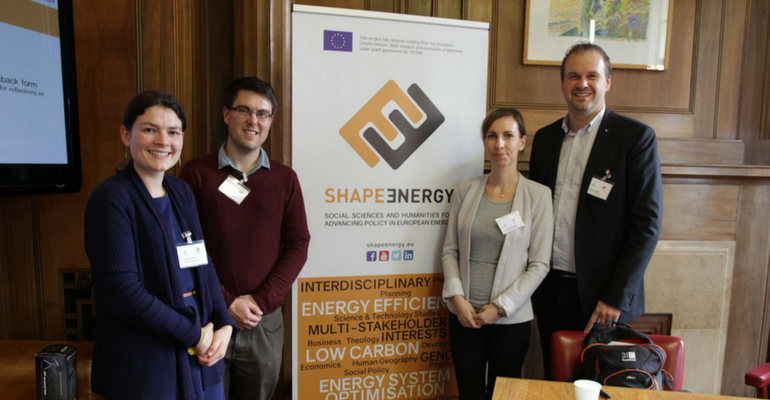
In the energy agenda the technical results are more important as compared to consideretions about important human and social aspects. The European project Shape Energy tries to change this attitude promoting a better integration of social and humanistic sciences in projects about energy and transport financed by Horizon 2020 and others.
In February 2018 the Polytechnic of Turin organized two workshops for the coordinators committed to the innovation through collective projects. The participants of the two events have recognized the the added value generated by the integration of social sciences and humanistic subjects in projects about the energy sector finaced by the EU.
Through different innovative methods for the implementation of these workshops called “sandpit”, including storytelling and live-drawing, participants had the opportunity to formulate concrete ideas to imporve the impacts on society, talk about innovative methods for the interdisciplinary collaboration in the area of projects about the energy and transport sector, share the best procedures with a group of multidisciplinary experts from all Europe in a stimulating context in which it is possible to propose ideas for future projects on energy topics.
“It is necessary to look at energy politics from a financial point of view without forgetting their social, environmental, technical, decision-making aspects. To do so, it is pivotal to establish a dialogue between STEM researchers and SSH researchers” explained Professor Patrizia Lombardi, who is in charge of the project for the Polytechnic of Turin.
Among these key matters, that must absolutely be integrated in the Horizon 2020, there are some problems between qualitative and quantitative results, linguistic differences arising from interdisciplinary projects, energy efficacy and users involvement. In particular this last aspect puts into light how important it is to talk to a wider audience in order to make sure that the social impact of the projects in the energy sector is perfectly clear.
Participants have also underlined the importance of social acceptance, of user’s experience and of market researches, which are pivotal elements for the success of the projects. Their implementation from the early stages of the projects adds an additional level of difficulty, but it also makes it possible to increase the efficacy.
“We have to be open to different models of efficacy in order to show the impact that socio-economic sciences and humanistic subjects have on societies” said Andrea Bonaccorsi, lecturer of the keynot speech, of the University of Pisa, Senior Research Fellow at FBK-IRVAPP of Trento.
More than 100 representatives of institutions attendend the two sandpits. They came from 15 Countries: Blegium, Croatia, Denmark, France, Germany, Greece, Ireland, Italy, Norway, the Netherlands, Portugal, the United Kingdom, Slovakia, Spain and Hungary.
The participants represented a wide and diverse range of projects financed by Horizon 2020 and by the 7th PQ: Ambition; BestRES; Bio-HyPP; BIOROBURplus; BRISK2; CEMCAP; CONSEED; E2District; EMPOWERING; enCOMPASS; ENERGISE; ENLARGE; EnPC-INTRANS; ENTRUST; ESA 2.0; FLEXMETER; GEMex; interGRIDy; IRON; ISABEL; LIMPET; MAGIC-NEXUS; Mobility4EU; MOBISTYLE; NATCONSUMERS; PEMs4Nano; PVSITES; RenGen; ShaleXenvironmenT; SHAPE ENERGY; SHAR-Q; START2ACT; STOREandGO; SWInG; THOMSON; UPGRADE; ZERO-PLUS.

Trackbacks for this post